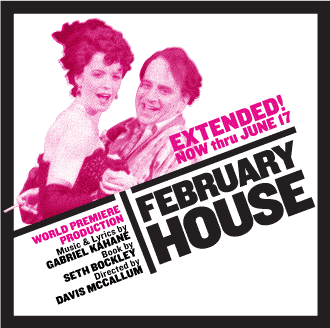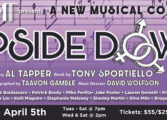Prof Miller@ The Theater.
Plays about real people are tricky things.
You’ve got to have interesting people to write about, and you’ve got to have them doing interesting things that are true to what they did in real life. Imagined dialog is perfectly fine; no one goes to the theater expecting a word-for-word transcript. But they do expect believability.
One current example is “The Columnist,” now on view at the Friedman Theater. Playwright David Auburn has met the believability standard quite effectively with his rich and complex portrait of the late newspaper columnist Joseph Alsop as a self-important man of not inconsiderable influence in the political arena of the mid-twentieth century.
The play has a nice arc of rise-and-fall, and while the character of Alsop is not a particularly sympathetic one, Mr. Lithgow’s performance opens up the possibility of sympathy from viewers who might be moved by the character’s sense of loss and loneliness by the play’s end. And, of course, John Lithgow is a very good actor—hence the nomination for a Tony Award for his performance.
The question you will have to answer for yourself is whether the subject of the play, a man whose day in the sun dates to a time more than five decades ago, is someone you care to know more about.
A newer addition to the realm of bio-play is “February House,” an unconventional yet highly compelling musical, running through June 17 (unless it is extended) at the Public Theater. It takes place during 1940-1941 and involves the real-life story of a boarding house in Brooklyn that for a time was the home to an astounding collection of composers, novelists, poets, and entertainers, including Benjamin Britten, W. H. Auden, Carson McCullers, and—believe it or not—Gypsy Rose Lee.
Immediately, you can check off the first criterion: interesting people to write about.
“February House” (the title refers to the fact that many of the residents shared February birthdays) imagines the day-to-day lives of these artists as they struggle with their creations and interact with one another.
Playwright Seth Bockley, who drew from a book on the subject written by Sherrill Tippins (credited as “an historical consultant”), wisely understood that the domestic situation, the artists’ temperaments, and the backdrop of World War II would provide more than enough dramatic interest around which to wrap the play. Thus, there are no outlandish moments of thunderous tension—just the normal neuroses of high gifted individuals trying to get along with their art and their lives.
More than enough to satisfy the second criterion: interesting people doing interesting things.
Add to that the wonderful score (music and lyrics by Gabriel Kahane), and you’ve got a splendid theatrical experience.
More about the music later, but first the set-up. The boarding house, a run-down Victorian townhouse filled with kitschy antiques and held together on a shoestring budget, is presided over by George Davis, a fiction editor and sometime novelist. Davis has connived a group of his friends and acquaintances to live together in a sort of artists’ colony. Since most of them (save for the very successful Gypsy Rose Lee) have precious little money, they agree.
And so we meet novelist Carson McCullers, recently fled from her husband Reeves, himself an on-again, off-again writer; British expats Benjamin Britten and poet W.H. Auden, who are collaborating on Britten’s first opera, “Paul Bunyan;” Britten’s lover, the tenor Peter Pears; and Auden’s lover, poet Chester Kallman. (In a touching scene, Auden and Kallman are “married,” in a ceremony presided over by George Davis, who invokes the ghost of Oscar Wilde as giving him the authority to do so.)
Later, the company is joined by Gypsy Rose Lee, who is working with Davis on a mystery novel called “The G-String Murders,” and writer/actress/political activist Erika Mann, daughter of novelist Thomas Mann and—to tie things up nicely—one-time wife of Auden and, apparently, a lover of Carson McCullers while living at February House.
Like I said, with this much reality, who needs to embellish?
The action of the play centers on these artists, their work, and their relationships with one another.
Underscoring all of this are Gabriel Kahane’s music and lyrics—art songs and show tunes and pop, full of wit and charm, evocative of both the era of the play and more modern times. I lost count of how many respectful nods I heard to other composers: traces of Jerome Kern, Cole Porter, and Gilbert and Sullivan (a whimsical number about bedbugs), as well as to Stephen Sondheim and Paul Simon. There is even a bit of the score to “Paul Bunyan,” and some of Auden’s poetry used as lyrics.
The company of actors is marvelous. I was quite taken with Kristen Sieh as the conflicted Carson McCullers, and with Stanley Bahorek and Ken Barnett as Benjamin Britten and Peter Pears (what a perfect Gilbert and Sullivan pair they are). But my hat is off to the entire cast—Julian Fleischer as the flamboyant George Davis; Erik Lochtefeld as a morose, romantic, and occasionally acid-tongued Auden; Kacie Sheik, ebullient as Gypsy Rose Lee; Stephanie Hayes as Erika Mann, A.J. Shively as Chester Kallman, and Ken Clark as Reeves McCullers.
I commend director Davis McCallum for keeping these diverse characters from becoming mere props for set pieces, and also the terrific on-stage musicians, with a special nod to Andy Stack, whose top-notch banjo work helps to underpin this crazy quilt of a show.
History has made it clear there is an audience for a show about Gypsy Rose Lee. I would suggest that Benjamin Britten, W. H. Auden, Carson McCullers and all of the others who shared their lives as part of February House make for equally compelling theater.
If you have enjoyed this column, you can read more of my reviews at my theater blog, Upstage-Downstage, available at www.upstage-downstage.blogspot.com.
See you @The Theater!

FEBRUARY HOUSETICKET INFORMATION
Tickets are now on sale!
Regular Tickets: $80-$90
Public Theater Member Tickets: $40
CLICK HERE or call 212-967-7555 to book your tickets now.



